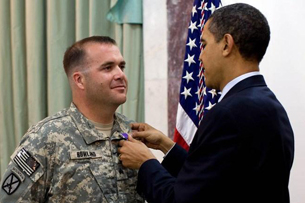
President Barack H. Obama awards the Purple Heart to a Soldier.
Soldier
Wounded, Ill, and Injured Soldiers
The Army is committed to providing the best possible care and support to all wounded, ill, and injured Soldiers and their Families so they may return to active duty or transition to civilian life as proud, productive Veterans. Wounded, ill, and injured Soldiers requiring at least six months of rehabilitative care and complex case management are assigned to a Warrior Transition Unit (WTU). The primary mission of these Soldiers is to heal and transition.
To complete the mission of healing and transition, the Soldier is responsible for attending all medical and non-medical appointments with professionals such as social workers, physical therapists, and occupational therapists, and for following the advice of the clinicians assigned to his/her case.
What Soldiers Can Expect Upon Entering the WTU
Each Soldier will have a unique, personal experience in the WTU, based on their medical condition and treatment requirements. Upon entering a WTU, the Soldier will in-process to the new unit through the Headquarters and Headquarters Company (HHC). This inprocessing includes:
- Clinical screenings from medical, behavioral, and other health professionals
- Administrative actions, such as receiving orders, ID cards, and meal cards
- Actions affecting the Soldier's overall well-being, such as housing, finance, and visiting the Soldier and Family Assistance Center (SFAC)
Comprehensive Transition Plan
While in-processing through the HHC, Soldiers will complete a Comprehensive Transition Plan (CTP) within approximately 30 days of arriving at the WTU. The CTP is a six-part systemized process for every Soldier that includes an individual plan that the Soldier builds for him/herself with the support of WTU cadre. By using the CTP, the Soldier and his/her Family will develop specific, personal goals to achieve at each stage of recovery and transition. This CTP will guide the Soldier's day-to-day activity for the rest of his/her time in the WTU.
Triad of Care
Each Soldier will benefit from a Triad of Care. These professionals work together to coordinate all aspects of the Soldier's medical and non-medical care.
- Primary Care Manager is usually a physician who develops an integrated treatment plan for the Soldier, provides acute and ongoing care to address medical issues, collaborates with specialists on care needs, and evaluates the Soldier's medical profile status
- Nurse Case Manager helps the Soldier regain health or improved functional capability, facilitates the development and implementation of a clinical plan with performance goals that support the CTP, ensures that the Soldier receives appropriate care related to all identified medical conditions, facilitates and coordinates medical appointments, helps identify challenges the Soldier is experiencing, and acts as a resource to link the Soldier to other systems
- Squad Leader is the first line supervisor for the Soldier and the Soldier's link to the Chain of Command and facilitates the resolution of any administrative issues that arise. The squad leader serves as the Soldier's guide through the WTU process and enforces military standards
Multidisciplinary Team: The Triad of Care is augmented by a multidisciplinary team of health care and transition specialists who work together to coordinate and optimize the care and transition of each individual Soldier. This team includes social workers, physical therapists, occupational therapists, AW2 Advocates, and many other professionals.
Army Wounded Warrior Program (AW2)
The most severely wounded, ill, and injured Soldiers who meet specified eligibility requirements will simultaneously be assigned to the Army Wounded Warrior Program (AW2). AW2 Advocates are located at most military treatment facilities and VA medical centers to provide personalized support to each AW2 Soldier, Veteran, and his/her Family to foster long-term independence—even when the Soldier transitions to Veteran status.
Resources for wounded, ill, and injured Soldiers and Veterans

